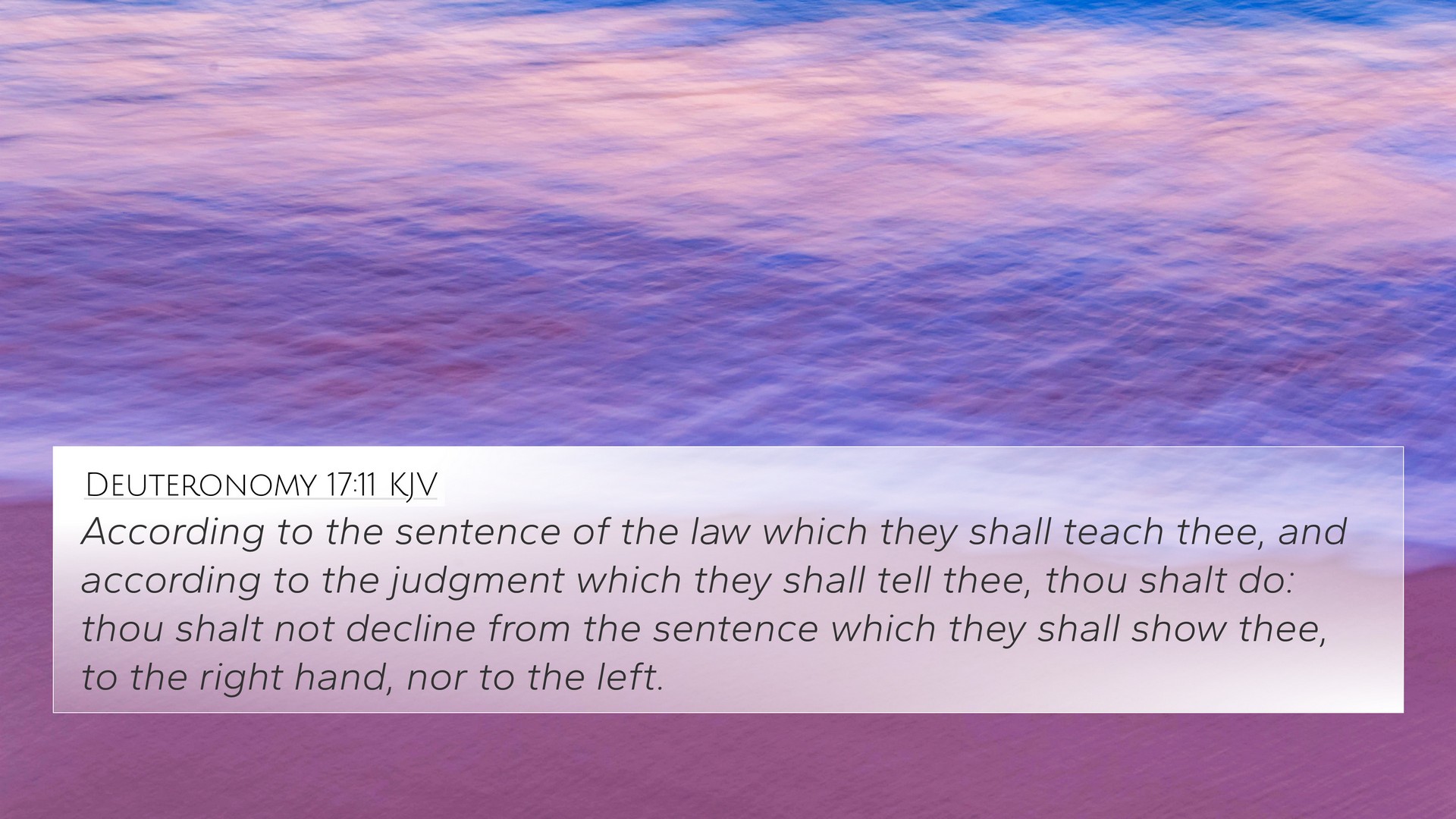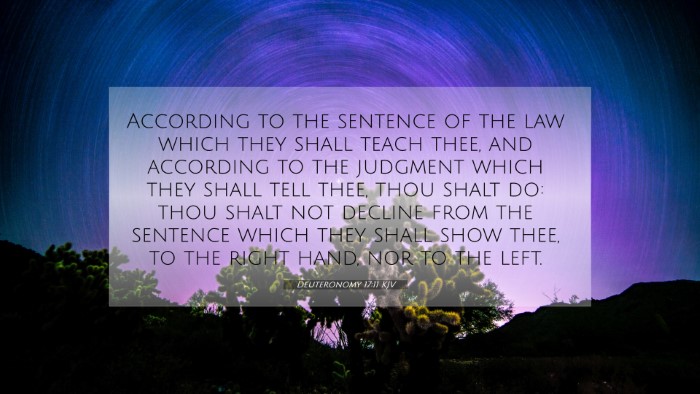Understanding Deuteronomy 17:11
Bible Verse: “According to the sentence of the law which they shall teach thee, and according to the judgment which they shall tell thee, thou shalt do: thou shalt not decline from the sentence which they shall show thee, to the right hand, or to the left.”
Summary of Meaning
Deuteronomy 17:11 emphasizes the importance of adhering to the teachings and judgments established by the priests and judges in Israel. This verse outlines the principle that the community is to follow the laws and rulings as instructed by those who hold authority in spiritual matters. The directive is clear: one must not deviate from these teachings, whether to the left or the right, signifying a call to obedience and alignment with God’s law.
Commentary Insights
Matthew Henry's Commentary
Matthew Henry reflects on the authority vested in the priests and judges, underscoring that God’s law is to be interpreted and enforced by those appointed to such positions. He notes the gravity of obeying the legal decisions communicated by these leaders, as they are seen as guides in maintaining spiritual and social order. Henry emphasizes that deviation from established judgment not only undermines the authority of God’s law but also risks moral confusion within the community.
Albert Barnes' Notes
Albert Barnes highlights the significance of this instruction in terms of maintaining justice and the rule of law in Israel. He interprets the phrase “to the right hand or to the left” as a metaphor for the necessity of strict adherence to divine ruling without personal bias or self-interest influencing the decisions. Barnes elaborates that these guidelines were intended to protect the people from chaos and ensure they remained aligned with God’s covenant.
Adam Clarke's Commentary
Adam Clarke discusses the historical context of the verse, suggesting that it served as a foundational principle for Israel’s legal system. Clarke posits that the command given in this verse not only reaffirms God’s authority in legislative matters but also offers a framework for civil obedience among the Israelites. He indicates that such adherence is crucial for the spiritual health and communal stability of the nation.
Connections to Other Bible Verses
Deuteronomy 17:11 resonates with several other passages, reinforcing its themes of authority, obedience, and the critical nature of law within the community of faith. Below are some key cross-references:
- Exodus 18:20: “And you shall teach them the statutes and the laws, and shall show them the way in which they must walk and the work they must do.”
- Deuteronomy 16:18: “You shall appoint judges and officers in all your towns that the Lord your God is giving you…”
- Matthew 23:2-3: “The scribes and the Pharisees sit on Moses' seat, so do and observe whatever they tell you, but not the works they do…”
- Joshua 1:8: “This Book of the Law shall not depart from your mouth, but you shall meditate on it day and night…”
- 2 Timothy 3:16: “All Scripture is breathed out by God and profitable for teaching, for reproof, for correction, and for training in righteousness…”
- Hebrews 13:17: “Obey your leaders and submit to them, for they are keeping watch over your souls…”
- James 4:7: “Submit yourselves therefore to God. Resist the devil, and he will flee from you.”
Thematic Connections
This verse highlights the themes of obedience and respect for established authorities which is a recurring motif throughout the Bible. The connection between human authority and divine command is significant in both the Old and New Testaments. Each of these scriptures emphasizes the importance of following the law, not just for the sake of order, but as a reflection of one's devotion to God and His standards.
Cross-Referencing Methodology
Understanding Deuteronomy 17:11 involves utilizing effective cross-referencing. Here are some approaches:
- Bible Concordance: Utilizing a concordance can help one find related verses and explore their contexts.
- Bible Cross-Reference Guides: These tools provide structured insights into biblical connections, aiding deeper study.
- Comparative Bible Study: Analyzing similar themes across different books can elucidate the continuity of scripture.
- Chain References: Following thematic references can enhance understanding of interconnected biblical messages.
Additional Insights
By studying Deuteronomy 17:11 alongside these references, believers can gain a more profound understanding of the importance of authority structures within the faith community and their role in spiritual compliance. The practice of cross-referencing allows for a richer biblical dialogue and deeper insights into the nature of God’s law and its application in everyday life.
Conclusion
Deuteronomy 17:11 serves as a powerful reminder of the necessity of obeying God’s laws as interpreted by appointed leaders. By engaging with related verses and using tools for cross-referencing, individuals can enrich their understanding and uncover meaningful connections across scripture that enhance their faith journey.
















